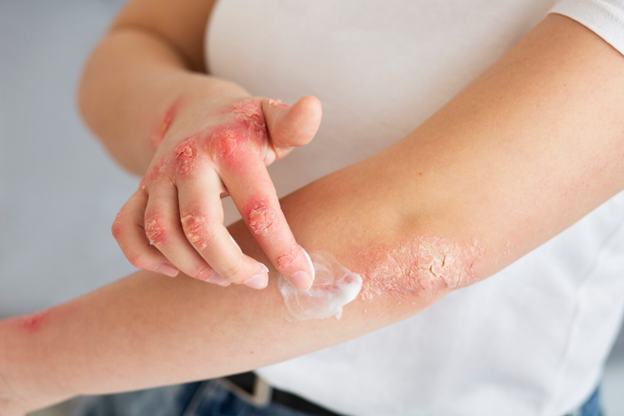Psoriasis is not just a skin condition; it’s a life challenge. This chronic skin condition affects millions, leaving marks not only on the skin but also on the mind. Understanding the psychological impact of psoriasis is crucial. It’s not just about addressing those visible patches but also about nurturing mental health. Suffering from psoriasis can make anyone feel down, so it’s important to acknowledge its broader impacts.
Understanding the Psychological Burden of Psoriasis
Living with psoriasis involves more than just itchy patches. It can lead to feelings of anxiety, depression, and even social isolation. These emotional challenges can be as difficult to manage as the physical symptoms. Flare-ups are often triggered by stress, which creates a vicious cycle. This ongoing stress aggravates skin conditions, making mental health management a key part of treatment. Often, what you feel inside makes it harder to cope with what you see outside, and vice-versa. Knowing how psoriasis affects your mind helps in breaking this cycle. Addressing mental health is just as important as treating the physical symptoms.
Recognizing Signs of Distress in Psoriasis Patients
Spotting the signs of anxiety and depression linked to psoriasis is vital. Watch out for feeling down, losing interest in hobbies, or pulling away from social activities. These are key indicators of stress and emotional burden. Changes in daily habits, like social withdrawal and lack of interest, serve as red flags. Noticing a shift in how you handle everyday tasks is crucial. Early recognition of these signs can lead to better management and improve life quality. When left unchecked, these signs can worsen over time, complicating both emotional and physical symptoms.
Strategies for Boosting Mental Wellbeing in Psoriasis Patients
Don’t hesitate to seek professional help. Therapy can be a great start, offering a safe space to talk. Support groups let you connect with others who share similar experiences, fostering a sense of belonging and understanding. It’s essential to educate family and friends too, so they can offer better support. Stress management techniques like mindfulness and yoga can be powerful tools. They help center your mind, reducing stress and calming flare-ups. Improving sleep quality and watching your diet also play vital roles. A balanced lifestyle is a protective shield against stress, helping you manage the psychological impact that comes with psoriasis.
Practical Tips to Boost Mental Wellbeing:
- Try therapy: It’s a professional support system.
- Join support groups: Share stories and learn from others.
- Practice mindfulness: Techniques like yoga offer peace.
- Focus on sleep: Aim for restful, regular sleeping patterns.
Empowering Yourself Through Knowledge and Advocacy
Knowing your condition and understanding psoriasis treatment options empowers you. The more you know, the better choices you make about your health. Advocacy means speaking up for yourself, helping you gain control over your daily life. Exploring psoriasis prevention tips can lead to a proactive approach, preventing flare-ups before they start. Taking charge isn’t just for the physical—you’re taking control of your mental health, too.
Navigating Social Situations with Confidence
Psoriasis can make social situations tricky, but it doesn’t have to. Building self-confidence is key. Practice handling those awkward questions with calm and honesty. Positive relationships are a safety net; they support and uplift you. When you nurture these bonds, you create a supportive environment, reducing anxiety in social settings.
Social Confidence Tips:
- Focus on the positive: Surround yourself with supportive people.
- Handle questions gracefully: Prepare responses for common queries.
- Build self-esteem: Acknowledge strengths and efforts.
The Role of Comprehensive Psoriasis Management
Effective management of psoriasis is about the whole picture—balancing physical and mental health. Discussing mental health during dermatological visits offers a fuller approach to dealing with symptoms of psoriasis. This discussion leads to holistic care, targeting stress that worsens skin issues. Comprehensive care isn’t just a one-time fix; it’s an ongoing journey. With the right approach, both skin and mind benefit, improving overall life quality.
Cultivating a Positive Mindset and Practicing Self-Compassion
Self-compassion is accepting yourself, flaws and all. Celebrate small victories. Recognize effort because each step forward is progress. Body positivity boosts self-esteem and decreases feelings of negativity. A positive mindset fuels healing, motivating you to face each day with courage. By focusing on what you can achieve, you navigate psoriasis and life’s challenges with grace.
Prioritizing Self-Care for Mental and Physical Health
Develop a self-care routine that balances fun with relaxation. It’s about finding happiness in hobbies and leisure. Joy lifts burdens, providing necessary breaks from psoriasis worries. Self-care isn’t selfish; it’s needed to stay mentally and physically healthy.
Conclusion
Boosting mental wellbeing in psoriasis patients involves various strategies. Recognizing signs of stress, seeking help, and practicing self-care are crucial steps. By learning different ways to manage both emotional and physical symptoms, life with psoriasis becomes more manageable. Taking proactive steps in seeking mental health support leads to a brighter future.

